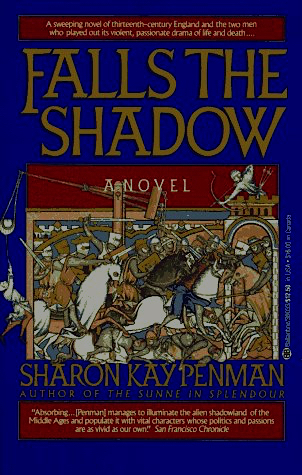
Falls the Shadow (Welsh Princes Trilogy Book 2), Sharon Kay Penman. New York: Ballantine Books, 1988. [Note: Publisher link to this edition unavailable; link is to another edition.]
Summary: A historical fiction account of the tense relationship and eventual conflict between incompetent Henry III (and his son Edward I) and Simon de Montfort, Earl of Leicester and husband of Henry’s sister, as well as the struggle of Llewellyn, eventual Prince of Wales and grandson of Llewellyn the Great to hold and unite Wales against the English.
In recent years I’ve discovered the historical fiction of Sharon Kay Penman (I reviewed Here Be Dragons, the first volume of this series on Llewellyn the Great in July 2015) and have loved her introduction to the world of the thirteenth century and the conflicts between England and Wales. This is definitely “backlist” and you probably can find inexpensive used copies of the whole series, which I would definitely recommend.
This volume is actually focused less on Welsh princes than on Simon de Montfort and the increasing tensions between him and his brother-in-law, King Henry III that eventually led to all-out war. Penman in an Author’s Note, informs us that she originally had planned to split focus between Llewellyn and Simon but found she could not do justice to both in the same book and so devoted this one to Simon.
Who was this Simon and why did he pose such a threat to Henry? Born in France, he accompanied his father in battle as a boy and learned courage, the leadership of others, and strategic thinking. An ambitious young man, he seeks to claim the family lands in England and persuades the Earl of Chester, a childless old man to yield them to him. He persuades Eleanor (Nell), sister of Henry to marry him, forsaking a vow of chastity she’d sworn after the death of her first husband. He effectively served the king in suppressing unrest in Gascony, only to be called to account by the King who listened more to the rebels than to him, sowing seeds of discord.
Meanwhile, his sons Bran and Harry, and Henry’s son Edward become fast friends and hell-raisers. Henry, however, in contrast to Simon, is ineffective in battle and without sense in his administration, spending lavishly in excess of his means. Eventually, Henry is forced by Parliament, with Simon in the lead to agree to the Provisions of Oxford, which held the king accountable to his people. No king wished his power to be constrained by his subjects and this earned Simon his hatred, and sowed the seeds of war. Edward, deceiving Harry, rallies some of the Barons to the king’s cause, Simon suffers numerous setbacks and even flees to France at one point. Eventually he gains a decisive victory over the King, in part due to a battlefield error of Edward, at the Battle of Lewes in 1264. Simon attempts to rule in the King’s name implementing the Provisions, but quickly the situation degenerates as Edward escapes, the Barons rally to him, Simon and his son Bran are separated, and Bran decisively defeated by a lightning attack. Although helped by Llewellyn, Simon is undermanned and unaware of what has befallen his son, and is cornered by Edward at the fateful battle of Evesham in 1265.
In the backdrop of this primary narrative, is the uneasy relationship between Llewellyn and his younger brother Davydd over the leadership of Wales. As is the case in so much of royal history, it is the story of marriages between rival houses, and the conflicts of love and loyalty in consequence. Penman also exposes the plight of the Jews in England, hindered from all commerce but money lending, and hated for it, within often fatal consequences. We see the low status of the towns, expected to contribute to the king’s coffers, but enjoying no power, that Simon tried to elevate.
Simon de Montfort is remembered today as an early advocate of representative government. This work portrays him as a courageous man of integrity whose very convictions led to the tragedy of his end. He was too good for his King in many ways, earning the King’s undying hatred. In the end, men willingly followed him to death and pilgrims claimed healings at his grave. Unlike the religious martyrs under Henry VIII, Simon, portrayed by Penman as a God-fearing man of faith and friend of clergy, was a martyr to the idea that Kings should not be answerable to God alone, but also to those they rule. Penman not only tells a great story but does us a great service in bringing to life the greatness of Simon de Montfort, sixth Earl of Leicester.
Share this:





